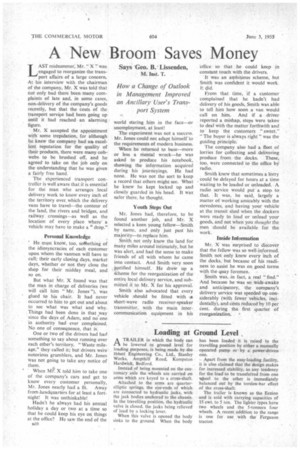A New Broom Saves Money
Page 44

If you've noticed an error in this article please click here to report it so we can fix it.
Says Ceo. B. ' Lissenden, M. Inst. T.
How a Change of Outlook in Management Improved an Ancillary User's Transport System
LAST midsummer; Mr. "X " was engaged to reorganize the transport affairs of a large concern. At his interview with the chairman of the company, Mr. X was told that not only had there been many complaints of late and, in some cases, non-delivery of the company's goods recently, but that the costs of the transport service had been going up until it had reached an alarming figure.
Mr. X accepted the appointment with some trepidation, for although he knew the company had an, excellent reputation for the quality of their products, there were many cob-webs to be brushed off, and he agreed to take on the job only on the understanding that he was given a fairly free hand.
The experienced transport controller is well aware that it is essential for the man who arranges local delivery work to know every inch of the territory over which the delivery vans have to travel—the contour of the land, the rivers and bridges, and railway . crossings—as well as the location of every place where' a vehicle may have to make a " drop."
Personal Knowledge
' He must know, too, sotething of the idiosyncracies of each customer upon whom the vanmen will have to call; their early closing days, market days, whether or not they close the shop for their midday meal, and so on. ,.
But what Mr. X found was that the man in charge of deliveries (we will call him " Mr. Jones "), was glued to his chair. It had never occurred to him to get out and about to see what was what and why. Things had been done in that way since the days of Adam, and no one in authority had ever complained. No one of consequence, that is.
One or two of the drivers had had something to say about running over each other's territory. "Waste mileage," they called it; but drivers were notorious grumblers, and Mr. Jones was not going to take any notice of them. . When MP X told him to take one of the company's cars and get to know every customer personally, Mr. Jones nearly had a fit. Away from-headquarters for at least a fortnight! It was unthinkable!
Hadn't he always had his annual holiday a day or two at a time so that he could keep his eye on things at the office? He saw the end of the world staring him in the face—or unemployment, at least!
The experiment was not a success. Mr. Jones could not adapt himself to the requirements of modern business. When he returned to base—more or less a Mental wreck—he was asked to produce his notebook, showing the information acquired during his journeyings. He had none. He was not the sort to keep a record that others might see. What he knew he kept locked up and closely guarded in his head. It was safer there, he thought.
Youth Steps Out
Mr. Jones had, therefore, to be found another job, and Mr. X selected a keen young fellow—Smith by name, and only just past his majority—to, replace him.
Smith not only knew the land for many miles around intimately, but he was alert, and had the sense to make friends of all with whom he came into contact. And Smith very soon justified himself. He drew up a scheme for the reorganization of the entire local delivery service, and submitted it to Mr. X for his approval_
Smith also advocated that every vehicle should be fitted with a short-wave radio receiver-speaker transmitter, with the main intercommunication equipment in his
office so that he could keep in constant touch with the drivers.
It was an ambitious scheme, but Smith was confident it would work. It did.
From that time, if a customer complained that he hadn't had delivery of his goods, Smith was able to tell him how soon a van would call on him. And if a driver reported a mishap, steps were taken to deal with the matter forthwith and to keep the customers "sweet.". " The buyer is always right" was the guiding principle.
The company also had a fleet of lorries for collecting and delivering produce from the docks. Thse,. too, were connected to the office by radio,
Smith knew that sometimes a lorry could he delayed for hours at a time waiting to he loaded or unloaded. A radio service would put a stop. tcr that. It was, he said, largely a matter of working amicably with the stevedores, and having your vehicle at the transit shed when the dockers were ready to load or unload your goods, and not when you thought the men should be available for the work.
Inside Information Mr. X was surprised to discover that the fellow was so well-informed. Smith not only knew every inch of the docks, but because of his readiness to assist he was on good terms wi,th the quay foremen.
Smith was, in fact, a real "find." And because he was so wide-awake and anticipatory, the company's delivery service was speeded up considerably (with fewer vehicles, incidentally), and costs reduced by 10 per cent. during the first quarter of reorganization. •




































































































